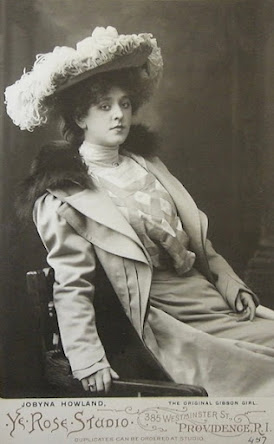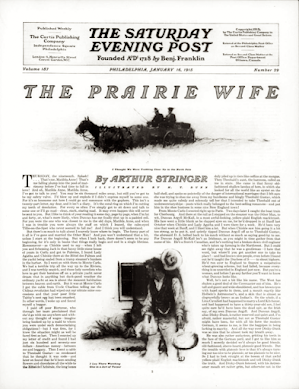Madge Macbeth never visited the Yukon, but that didn't prevent her from setting her 1917 novel Kleath in Dawson City. I don't own a copy, and haven't read it, though it is available online.
This isn't about that book, rather the film it inspired.
Two years after publication, the motion picture rights to Kleath were sold to the Mayfair Photoplay Corporation by her American publisher Small, Maynard & Co. Macbeth received a 65% cut, amounting to $442. The resulting film, The Law of the Yukon (1920), takes its title from a Robert Service poem. The Bard of the Yukon was given sole credit.
I wonder how much Service was paid for lending his name.
Bet it was more than $442.
The film The Law of the Yukon has nothing to do with Service. It's not in any way based on his "verse Classic." If you don't believe me, I'm providing the Service poem in full. If you do believe me, feel free to skip.
THE LAW OF THE YUKON
This is the law of the Yukon, and ever she makes it plain:
"Send not your foolish and feeble; send me your strong and your sane—
Strong for the red rage of battle; sane, for I harry them sore;
Send me men girt for the combat, men who are grit to the core;
Swift as the panther in triumph, fierce as the bear in defeat,
Sired of a bulldog parent, steeled in the furnace heat.
Send me the best of your breeding, lend me your chosen ones;
Them will I take to my bosom, them will I call my sons;
Them will I gild with my treasure, them will I glut with my meat;
But the others—the misfits, the failures—I trample under my feet.
Dissolute, damned and despairful, crippled and palsied and slain,
Ye would send me the spawn of your gutters—Go! take back your spawn again.
"Wild and wide are my borders, stern as death is my sway;
From my ruthless throne I have ruled alone for a million years and a day;
Hugging my mighty treasure, waiting for man to come,
Till he swept like a turbid torrent, and after him swept—the scum.
The pallid pimp of the dead-line, the enervate of the pen,
One by one I weeded them out, for all that I sought was—Men.
One by one I dismayed them, frighting them sore with my glooms;
One by one I betrayed them unto my manifold dooms.
Drowned them like rats in my rivers, starved them like curs on my plains,
Rotted the flesh that was left them, poisoned the blood in their veins;
Burst with my winter upon them, searing forever their sight,
Lashed them with fungus-white faces, whimpering wild in the night;
Staggering blind through the storm-whirl, stumbling mad through the snow,
Frozen stiff in the ice-pack, brittle and bent like a bow;
Featureless, formless, forsaken, scented by wolves in their flight,
Left for the wind to make music through ribs that are glittering white;
Gnawing the black crust of failure, searching the pit of despair,
Crooking the toe in the trigger, trying to patter a prayer;
Going outside with an escort, raving with lips all afoam,
Writing a cheque for a million, driveling feebly of home;
Lost like a louse in the burning . . . or else in the tented town
Seeking a drunkard's solace, sinking and sinking down;
Steeped in the slime at the bottom, dead to a decent world,
Lost 'mid the human flotsam, far on the frontier hurled;
In the camp at the bend of the river, with its dozen saloons aglare,
Its gambling dens ariot, its gramophones all ablare;
Crimped with the crimes of a city, sin-ridden and bridled with lies,
In the hush of my mountained vastness, in the flush of my midnight skies.
Plague-spots, yet tools of my purpose, so natheless I suffer them thrive,
Crushing my Weak in their clutches, that only my Strong may survive.
"But the others, the men of my mettle, the men who would 'stablish my fame
Unto its ultimate issue, winning me honor, not shame;
Searching my uttermost valleys, fighting each step as they go,
Shooting the wrath of my rapids, scaling my ramparts of snow;
Ripping the guts of my mountains, looting the beds of my creeks,
Them will I take to my bosom, and speak as a mother speaks.
I am the land that listens, I am the land that broods;
Steeped in eternal beauty, crystalline waters and woods.
Long have I waited lonely, shunned as a thing accurst,
Monstrous, moody, pathetic, the last of the lands and the first;
Visioning camp-fires at twilight, sad with a longing forlorn,
Feeling my womb o'er-pregnant with the seed of cities unborn.
Wild and wide are my borders, stern as death is my sway,
And I wait for the men who will win me—and I will not be won in a day;
And I will not be won by weaklings, subtle, suave and mild,
But by men with the hearts of vikings, and the simple faith of a child;
Desperate, strong and resistless, unthrottled by fear or defeat,
Them will I gild with my treasure, them will I glut with my meat.
"Lofty I stand from each sister land, patient and wearily wise,
With the weight of a world of sadness in my quiet, passionless eyes;
Dreaming alone of a people, dreaming alone of a day,
When men shall not rape my riches, and curse me and go away;
Making a bawd of my bounty, fouling the hand that gave—
Till I rise in my wrath and I sweep on their path and I stamp them into a grave.
Dreaming of men who will bless me, of women esteeming me good,
Of children born in my borders of radiant motherhood,
Of cities leaping to stature, of fame like a flag unfurled,
As I pour the tide of my riches in the eager lap of the world."
This is the Law of the Yukon, that only the Strong shall thrive;
That surely the Weak shall perish, and only the Fit survive.
Dissolute, damned and despairful, crippled and palsied and slain,
This is the Will of the Yukon,—Lo, how she makes it plain!
Not much in the way of plot, is there.
In an interview published under the title 'Look to Poems for New Ideas' in the 24 April 1920 issue of trade journal Exhibitors Herald, Isaac Wolper, the president of Mayfair, hints at the truth:
Because The Law of the Yukon is a lost film, I've relied on old reviews for what it's about. The most detailed I've found comes courtesy of the 11 November 1920 edition of the Daily Colonist:
Morgan Kleath comes to Gold City, a bustling mining camp in the Klondike country, in the film "the law of the Yukon," which was shown for for the first time at the Variety Theatre yesterday. Kleath makes his way to the "San Domingo," the principal gathering place and meets Tim Meadows, the proprietor, who had induced him to come to Gold City to establish and edit a daily paper.
Tim introduces Kleath to his daughter Goldie, whom he worships and guards with jealous care. Kleath invites Goldie to dance. Joe Duke, who as been paying attention to Goldie, conceives a violent dislike for Kleath and with the aid of his friend Jake Nichols, is able to pick a quarrel with him.
A fight follows, in which Duke receives a sound thrashing. Jake, seeing the turn of events and, striving to aid his fried, stabs Morgan Kleath in the arm.
Barney McCool, a good natured old Irishman, who is known as "the biggest liar in Gold City," takes a strong fancy to Kleath and becomes his good man, Friday. He takes the wounded man to his log cabin and Dr. Meredith, the only physician in the town, waits on him. Mrs. Meredith, hearing of the newcomer, calls on him. She at once becomes infatuated with Kleath. Goldie to is strongly drawn to him.
Everybody is anxious to know Kleath's past. His silence furnishes food for speculation. On two different occasions – once when he had picked a lock with a rusty nail, and once when he opened Tim Meadow's safe after the combination had been lost, he played into the hands of his enemies. These enemies, seeking to discredit him, circulate a story that Morgan Kleath is a yeggman, a criminal fugitive from the States.
Duke, harboring revenge, sees his way clear to rob Tim Meadow' safe and have suspicion point towards Kleath. Duke and his partner, Jake Nichols, are successful in luring Goldie and Morgan Kleath to a deserted cabin, where they are forced to remain all night. During the night Duke and Jake commit the robbery.
Kleath's feat of opening the safe is remembered and he is arrested and charged with the grave crime. Before leaving the deserted cabin, Kleath extracts a promise from Goldie that she will not mention the fact that they spent the night there. This, of course, is done to protect her good name. Kleath's silence compels the court to declare him guilty. Goldie, unable to keep silent, lays bare the whole circumstance. A stranger, a woman, appears dramatically and reveals the history of Kleath's past life (an honorable history, by the way) and herself as the accomplice of Duke and Nichols. Duke, infuriated at the turn of events, shoots the woman. After a lapse of time Kleath and Goldie leave the Klondike for the "Outside" as man and wife, and this the story ends happily, as it should.
 |
Exhibitors Herald, 12 June 1920
|
Because I haven't read the novel, I can't speak to the accuracy of the plot synopsis found in the this review from the November 1917 issue of the
Canadian Magazine:
"...the story, if set for moving pictures, undoubtably would be a success."
In her 1957 memoir, Boulevard Career, Madge Macbeth devotes all of five sentences to Kleath:
It was published in Boston and for several weeks I was deliriously happy. Then I learned that it was being filmed without my knowledge or consent. The Author's League of America took the matter up but there was nothing to be done because in my ignorance I had turned all rights over to the publisher. The film appeared under Robert Service's title, The Law of the Yukon, and my name was not mentioned!
I got enough money from the venture to buy a cheap fur coat.
The $442 she received in 1920 would amount to under six thousand today. So, yeah, a cheap fur coat.
All this leaves me with this question: We can't see the movie, but should we be reading the book?
A Bonus: In the
Exhibitors Herald article, I happened to catch Isaac Wolper referencing
The Miracle Man, almost certainly the most important lost film based on a Canadian novel:
Ideas lift a picture far above the commonplace level. Analyze one of the greatest pictures ever produced, 'The Miracle Man.' What made it great? Why was the public response to it so eager and spontaneous? The crux of the reason is expressed in one word. 'Idea'! The picture conveyed a poetic idea beautifully expressed.
Related posts:






















































